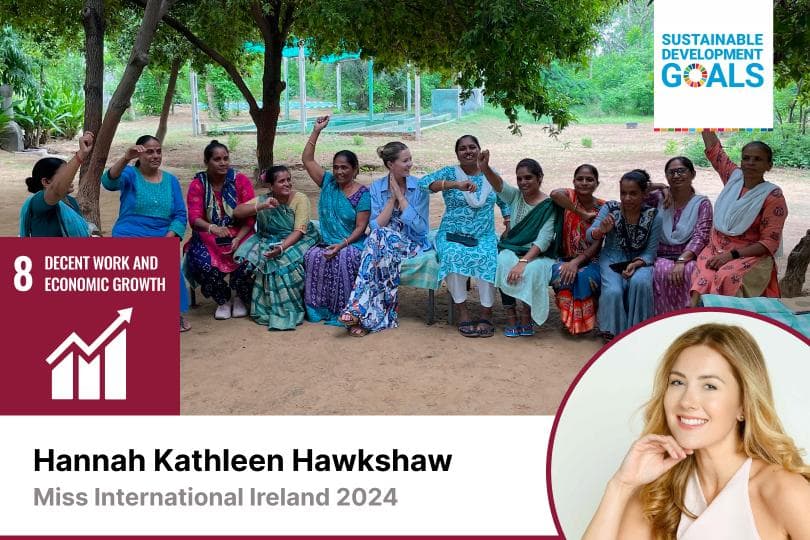A New Society Rises!
Explore how SEWA empowers women and fuels growth to revolutionise SDG 8's vision for economic justice.

In the bustling landscape of global development, few endeavours encapsulate the essence of progress as profoundly as Sustainable Development Goal 8: Decent Work and Economic Growth. At its core lies a fundamental belief in fostering inclusive economies, ensuring just and equitable employment opportunities, and catalysing sustainable prosperity for all. In this pursuit, the story of SEWA - The Self Employed Women’s Association, emerges as a pioneer of empowerment and transformation. With over 2.9 million members spanning India and beyond (across 18 states), SEWA stands as a testament to the power of collective action, grassroots mobilisation, and unwavering commitment to the principles of SDG 8. Join us as we delve into the remarkable journey of SEWA, exploring how it not only uplifts individual livelihoods, but also propels entire communities towards a future defined by dignity, resilience, and economic justice.
Understanding SDG 8: Empowering Lives, Enabling Growth
Set forth by the United Nations, SDG 8 embodies a multifaceted approach to fostering economic progress and social inclusion on a global scale. Central to its mandate are three core elements:
1. Promotion of Decent Work: SDG 8 underscores the importance of creating opportunities for dignified employment, ensuring fair wages, safe working conditions, and access to social protection. The objective is to eradicate poverty, reduce inequality, and promote inclusive growth by prioritising and facilitating decent working conditions.
2. Sustainable Economic Growth: At the heart of SDG 8 lies a commitment to fostering sustainable economic growth that prioritises environmental conservation, innovation, and social equity. The objective is to build resilient economies capable of withstanding global challenges, by promoting policies and initiatives that balance economic prosperity with environmental stewardship.
3. Youth Employment and Entrepreneurship: Recognising the essential role of youth in driving long-term growth, SDG 8 advocates for the creation of meaningful entrepreneurship and employment opportunities. The objective is to harness the potential of young people as agents of change and innovation by investing in education, skills development, and equal access to resources regardless of economic background.
SDG 8 serves as a cornerstone of the broader sustainable development agenda, underpinning efforts to achieve a world where economic growth is not only consistent but also inclusive, equitable, and sustainable. As economies continue to evolve in an era of globalisation and technological advancement, prioritising decent work and economic growth has never been more pressing. By advancing SDG 8, nations can pave the way for a future where prosperity is shared by all, leaving no one behind.
A Legacy of Love
SEWA is more than just an organisation; it's a thriving community rooted in compassion, understanding, education, and self-sufficiency. The SEWA approach is unique because it takes a holistic view of workers. It addresses their needs not only as labourers but also recognises the unique challenges faced by women, including systemic inequality, domestic violence, and the interconnectedness of identities as mothers and homemakers. This inclusive perspective has spurred the development of innovative strategies to combat poverty and vulnerability, enabling members to overcome generational barriers and achieve sustainable livelihoods.
On a trip to India last year, I had the opportunity to meet with visionary SEWA leaders, including Jyoti Macwan and Smita Bhatnagar who offered a glimpse into the rich tapestry of SEWA's history and ethos. Founded in the early 1970s by the indefatigable champion of women's rights and Gandhian principles, Ela Bhatt, SEWA continues to embody her values of service and transformation. Even decades later, Bhatt's dedication to justice and equality resonates at the core of the organisation, driving its mission forward with passion and purpose.
Let us explore how SEWA, born and rooted in India, is dynamically advancing the UN’s multifaceted approach to SDG 8:
1. Promotion of Decent Work: SEWA's Impact on Dignified Employment
SEWA, the Self-Employed Women’s Association, stands as a beacon of hope for millions of women in India and beyond, championing the cause of decent work and dignified employment. Founded on the Gandhian principles of truth, non-violence, and the integration of all faiths [How Gandhian Philosophy is Transforming Corporate Leadership], SEWA has spent over five decades empowering marginalised women workers in the informal economy. With a membership exceeding 2.9 million, SEWA's influence extends across 18 states in India, uniting women in their pursuit of full employment and self-reliance. Truly, SEWA is a sisterhood with a proven track record and transformative potential.
The essence of SEWA lies in its holistic approach to addressing the multifaceted needs of its members. By providing technical training, access to microfinance, market linkages, and leveraging technology, SEWA equips women with the tools and resources needed to thrive in their chosen trades. From agriculture to artisanal crafts, SEWA supports women to not only earn a livelihood but also to assert their value in the workforce.
By nurturing talent from within, SEWA impressively ensures that 80% of its leadership team is developed internally and promoted within the organisation. This commitment to upward mobility not only fosters a culture of empowerment but also serves as a testament to the organisation's dedication to its members' holistic growth and greater vision.
2. Sustainable Economic Growth: SEWA's Role in Building Resilient Communities
Through initiatives like the SEWA Bazaar and SEWA Managerial School, the organisation enables women to become leaders and entrepreneurs in their own right. By harnessing the power of digitalisation and modernisation, SEWA ensures that traditional trades like artisanal crafts remain relevant in an ever-evolving economy.
A prime example of SEWA's impact is the story of Sharda, whom I had the pleasure of meeting and conversing with as we travelled to one of SEWA’s farmer’s cooperatives. Sharda is a testament to the transformative power of education and empowerment. Thanks to SEWA’s partnership with the Head Held High Foundation [Pursuing SDG 1: $300 & 30 Hours to Escape Poverty], Sharda was eligible for several educational programs where she gained confidence as a leader and developed the skills necessary to uplift her community. Since her initial enrolment in 1998, she has become fluent in English and now runs a SEWA community.
3. Youth Employment and Entrepreneurship: SEWA's Vision for the Next Generation
Recognising the importance of engaging the younger generation, SEWA has adapted its approach to meet the evolving needs and interests of the younger members. By incorporating technological solutions and modernising traditional trades, SEWA ensures that the next generation is armed with the skills and resources needed to succeed in a rapidly changing world. Observing their fascination with technology, this initiative maintains the relevance of these trades while moving with the times to ensure the youth remain engaged with and continue nurturing these important cultural pillars.
Developing Leaders, One Woman at a Time
During my visit, I had the privilege of meeting Niru, a second-generation SEWA member who generously shared insights into the farming structure. With her mother-in-law preceding her as a SEWA member, Niru's involvement underscores the organisation’s intergenerational impact.
Beyond its economic contributions, SEWA's influence extends into the realm of social change. Niru highlighted how SEWA's ethos of sisterhood and solidarity has proven instrumental in reducing instances of domestic violence within member communities. This ripple effect not only transforms individual lives but also uplifts entire families, lighting the path towards a safer and more equitable future.
Niru also explained the impact SEWA had within her own family, noting how her husband's upbringing differed from others as a child of a SEWA member. This generational shift illustrates the enduring legacy of empowerment propagated by SEWA, shaping future generations and fostering a cycle of progress and resilience. Indeed, SEWA's commitment to uplifting women one at a time is not just a slogan but a tangible driver of positive change that reverberates throughout the community.
Niru herself embodies the organisation's commitment to empowering future leaders. With a 15-year background in organic farming, and now as a manager within her cooperative, Niru emphasised the value of education, particularly proficiency in English, in enabling the members to enhance market linkages and business opportunities. Through SEWA's support, Niru and others like her are breaking barriers and reshaping the landscape of economic opportunity for generations to follow.
Cultivating Connection
The ladies at the cooperative greeted me with immense kindness and invited me to share a traditional meal, comprising delicious, healthy ingredients, including millet grain. During our time together, amidst language barriers, I experienced an overwhelming sense of love, reminding me that compassion is intrinsic to our humanity. This experience underscored the transformative potential of solidarity and the power of sisterhood. If we embrace love as our natural human state, we unlock the ability to support and uplift one another, and that has the potential to ignite positive change on a global scale.
SEWA's ethos embodies this spirit of love and empowerment, serving as a formidable force for societal transformation. By preserving heritage while embracing modernity, SEWA helps women to realise their capabilities and access opportunities previously deemed out of reach, catalysing a ripple effect of progress and prosperity across India and beyond. Through its tireless efforts, SEWA continues to inspire hope, drive progress, and pave the way towards a future defined by dignity, resilience, and economic justice.



































